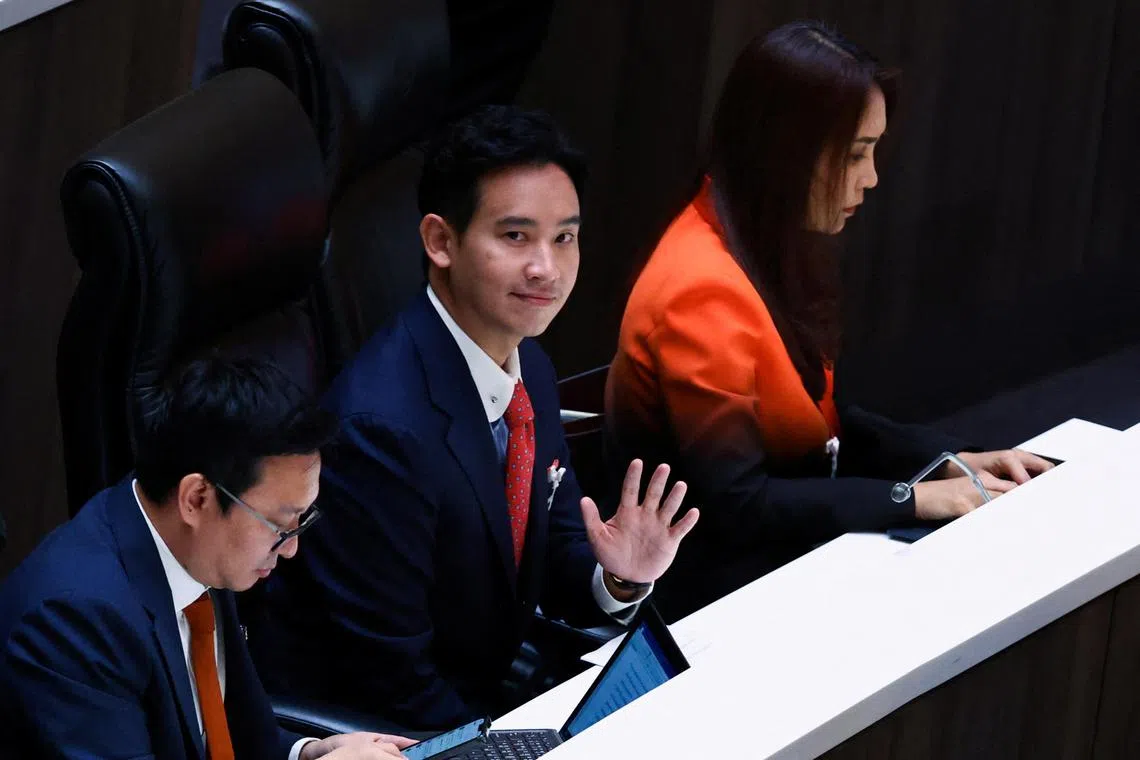Thai Parliament starts high-stakes vote on Pita’s prime ministerial bid
Sign up now: Get insights on Asia's fast-moving developments

Move Forward Party’s chances of forming a government with Mr Pita Limjaroenrat at its head look increasingly slim.
PHOTO: REUTERS
BANGKOK - Voting was under way in Thailand’s Parliament for a new prime minister, with Move Forward Party leader Pita Limjaroenrat running unopposed in what will be a critical test of his political clout.
The 42-year-old, US-educated liberal faces a big challenge in securing the required backing of more than half of the 749-member bicameral Parliament.
Many lawmakers are opposed to his party’s anti-establishment agenda, including a controversial plan to amend a law that prohibits insults of the monarchy.
The progressive Move Forward and its alliance partner Pheu Thai thrashed conservative pro-military parties in the May 14 election
But Mr Pita’s determination to pursue Move Forward’s agenda puts him at odds with a powerful nexus of conservatives and old-money families that have loomed large over Thai politics for decades, and will be almost certain to try to thwart him on Thursday.
His alliance controls 312 seats but to get the required 375 votes, he needs support from some of the 249 members of the conservative-leaning Upper House Senate, which was appointed by the military after a 2014 coup.
There were 676 lawmakers in attendance for the vote.
“I will do my best to match the hope and encouragement from the people,” Mr Pita told reporters as he arrived at Parliament.
“I’ll use this opportunity to find a consensus.”
A barrage of last-minute hurdles
Mr Pita faces the threat of parliamentary suspension, and two cases that have been filed against him and his party.
As the session began, the streets approaching Parliament were empty of people, and razor wire could be seen on highway overpasses.
Containers covered by tarpaulins decorated with images of Thai landmarks ringed the Parliament compound.
The elections in May saw the Thais reject the government of Mr Prayut Chan-o-cha, and Mr Pita’s MFP has formed an eight-party coalition that includes election runner-up Pheu Thai Party.
But the chances of Mr Pita leading the coalition into government are looking increasingly slim.
Finding the votes to claim the prime ministership will prove difficult in the Senate because of the MFP’s push to reform Section 112 of Thailand’s criminal code, which bans defaming or insulting the royal family.
His plans to shake up the country’s powerful business monopolies have also sparked concern.
Another hurdle emerged on Wednesday when the Election Commission recommended Mr Pita’s suspension from Parliament over allegations he broke campaign rules – a move the MFP branded as an “abuse of power”.
The recommendation followed a probe around Mr Pita’s ownership of shares in a media company, prohibited under Thai law.
Mr Pita has said he inherited the shares in the iTV television station, which has not broadcast since 2007, from his father and denies any wrongdoing.
In Parliament on Thursday, he defended himself again, telling lawmakers: “I am fully qualified.”
But it was clear the allegations will colour the vote.
“The Parliament cannot accept Pita’s name for consideration because he is prohibited to become a minister,” conservative senator Praphan Koonmee told Parliament, referencing the commission’s decision.
No other parties have announced alternative candidates.
If Mr Pita loses the first vote, the House Speaker will table session after session until a prime minister emerges – raising the spectre of weeks of deadlock and economic uncertainty.
Mr Prayut – now the caretaker prime minister and whose United Thai Nation Party finished a dismal fifth in the May elections – has announced his retirement from politics, but will remain premier until a new prime minister emerges.
May’s election was the first since huge pro-democracy demonstrations swept the capital Bangkok in 2020, when tens of thousands of people made unprecedented calls to reform the royal defamation laws.
Mr Pita’s MFP was the only party that campaigned on tackling the issue, but that too has landed it in trouble.
On Wednesday, the Constitutional Court accepted a case alleging that the promise amounts to attempting to “overthrow” the constitutional monarchy.
The party has two weeks to present its defence.
Dr Napisa Waitoolkiat, a political analyst with Naresuan University, said it appeared less and less likely that Mr Pita would become the premier.
But she added: “Anything is possible in Thailand.” REUTERS, AFP


